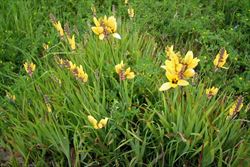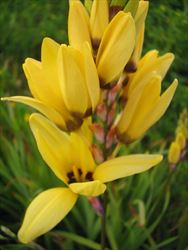Click on images to enlarge

infestation (Photo: Sheldon Navie)

habit (Photo: Sheldon Navie)

bright yellow flowers (Photo: Sheldon Navie)

plant with paler flowers and floral bracts, which is probably of hybrid origin (Photo: Rob and Fiona Richardson)
Scientific Name
Ixia maculata L.
Synonyms
Ixia fusco-citrina DC.Ixia hybrida Ker Gawl. (misapplied)Ixia maculata L. var. fusco-citrina (DC.) G.J. Lewis
Family
Iridaceae
Common Names
African corn lily, African cornlily, spotted African cornlily, yellow ixia
Origin
Native to south-western Africa (i.e. Cape Province in South Africa).
Naturalised Distribution
Widely naturalised in southern Australia (i.e. in southern New South Wales, Victoria, Tasmania, southern South Australia and south-western Western Australia). Also sparingly naturalised in south-eastern Queensland.
Naturalised overseas in south-western USA (i.e. California).
Notes
Yellow ixia (Ixia maculata) is regarded as an environmental weed in Victoria and Western Australia. It has escaped cultivation and become naturalised in open woodlands, around old settlements, along roadsides, and in disturbed sites and waste areas. Like other corm and bulb producing species, yellow ixia (Ixia maculata) spreads from disturbed areas into nearby natural areas, crowding out the plants which native animals depend for food.
In south-western Western Australia, yellow ixia (Ixia maculata) has invaded woodlands from Perth to Albany and inland to the Darling Ranges. In Victoria, it is listed as an environmental weed in Moyne Shire and in the Goulburn Broken Catchment. It has also been recorded in conservation areas in Victoria (i.e. Yarra Bend Reserve and Kaweka Wildflower Reserve), Tasmania (i.e. Gresswell Reserve and Greens Beach/Kelso Coastal Reserve) and Western Australia (i.e. the Brixton Street and Associated Wetlands).

